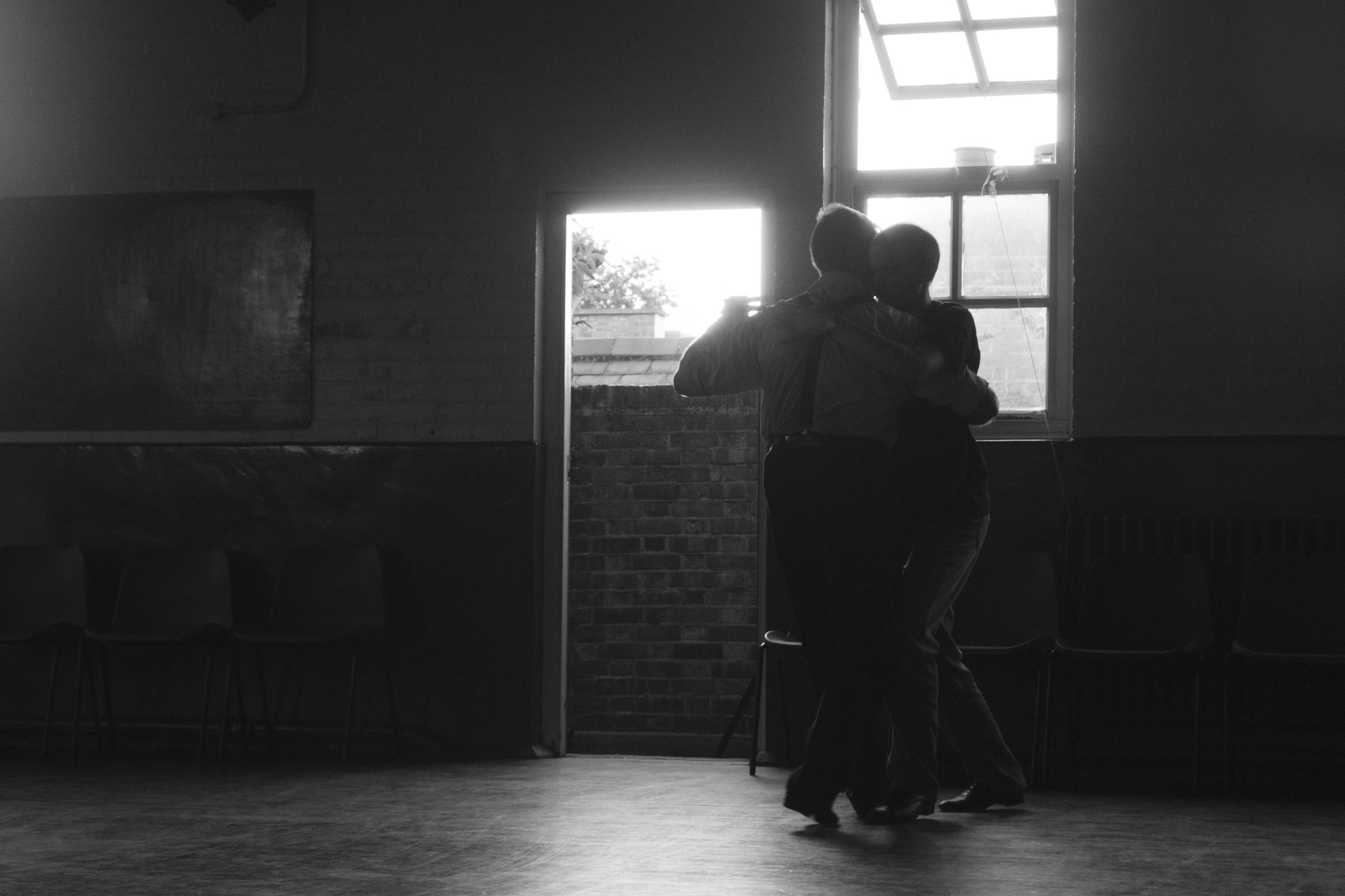What can queer tango learn from intersectionality?
A workshop delivered at Queer Tango Salon, London 2017. See the other contributions to the proceedings here.
by Carolyn and Rastko
Original invite:
In this workshop, we will collectively come up with a working definition of “intersectionality”. By looking at interlocking oppression and privilege which stem from gender, race, class, sexuality, dis/ability, nationality etc., in the context of queer tango we will ask:
- What spaces, processes or factors exclude certain groups of dancers?
- What are the pros and cons of mainstream gay culture for queer tango?
- What would a truly intersectional queer tango community look or feel like?
We will explore gender dynamics on the dance floor, so please bring your dancing shoes, but also, bring an item (an accessory or garment) which you can exchange with others during the workshop.
 (photo by Marie Eisenhardt)
(photo by Marie Eisenhardt)
We presented a workshop on the subject of intersectionality. We only had limited time and a small group of people (which included non-dancers as well as some folk with many years of dancing experience). We used the concept of intersectionality to interrogate our own experiences, and ask some questions, without necessarily aiming to find answers in what was a very small group, but with the hope that we would take these questions back to the places where we dance. These notes sum up and build on the discussions we had.
Intersectionality defined: A systemic and structural matrix of oppression and privilege affects us all according to Class - Gender - Race - Wealth - Dis/ability - Care commitments - Age - Body image - Language - Nationality and passport - Job/Housing security - Wage slavery… Any examination of oppression shows that various kinds of oppression intersect. Oppression in the capitalist world plays out as about economic power/access to money/time as well as multiple other effects on daily life. In a patriarchal/racist world it’s not just about the money, also about things like risk of physical attack in the street outside the venue. Racism contributes to and exacerbates the inequality of access to tango culture. Patriarchy poisons people’s minds and patriarchal binaries and leader-follower expectations also infect our spaces insidiously, even in queer tango.
Resistance to oppression by the tango community – i.e. those of us who organise promote and attend events – can take many forms.
-
We should consider where money from our tango activities goes. Rampant gentrification is hitting the kind of low-income neighbourhoods where tango historically flourished in Buenos Aires and London’s queer spaces are being closed down due to extreme development pressures. Our choice of venue is critical if we want to avoid contributing to gentrification and displacement of long-standing residents, amenities, businesses and communities.
-
We can actively choose not to exclude those with low or no income from attending milongas and practicas (and the Queer Tango Salon itself). It is often obvious that those setting the prices have no idea of just how poor some of us are. If somebody is reliant on benefits due to unemployment, and receiving just £10/day to live on (less if under the age of 25) - is offering a slight, tokenistic ‘concession’ really going to make the event something they can afford to attend? The Queer Tango Salon expected people in this category to pay a minimum of £20 just to attend for one day - and we wonder why our numbers are so low?! To counter this, we could offer a “sliding scale” or meaningful concessions. We could also advertise events in ways that make it clear that nobody will be turned away for lack of funds. There are plenty of examples which other groups and communities use we can draw on.
-
We can expand our understanding of who might participate in this kind of social dancing (in the workshop people mentioned projects which aim to introduce the benefits of dance to Deaf people, those with dementia, wheelchair users etc.).
-
We can continue to promote a more communal approach to social dancing which is not ego-driven performative/competitive and take this to the mainstream tango world.
-
We can use accessible, safe venues and advertise the ways in which we’ve improved on access and safety.
-
We can change the dynamics of the dance floor to be more inclusive to gender-fluid and less able-bodied people, more elderly people.
-
We can actively promote the inclusion of black and brown people.
-
We can reclaim the rebellious, anti-capitalist, anti-normative, transformative spirit of queerness.
-
We can celebrate the migrant-friendly, internationalist spirit of tango.
We invite you to reflect about these issues, and other ways in which environments we create either perpetuate oppression or don’t go far enough to challenge it. Reach out to other queers who are not usually seen at tango events, ask yourself why and find ways to bring them in. Find allies in queer communities and the mainstream tango world. We would also be happy to hear from you: queertango@aktivix.org.
